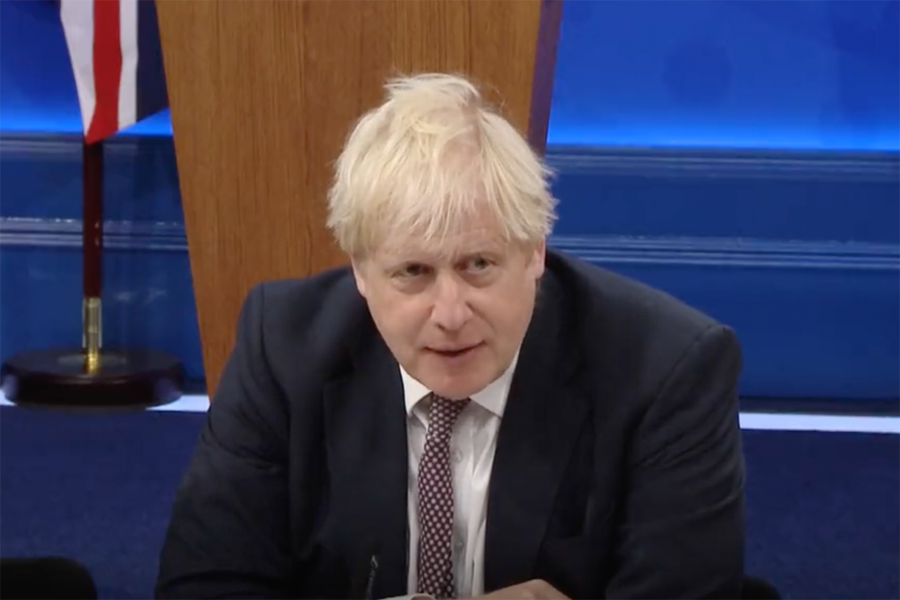PM rewrites fisheries policy on the hoof
NGOs jumped upon comments made by prime minister Boris Johnson during a climate change question and answer session held with primary school children in the run-up to COP26, reports Andy Read.
In his off-the-cuff comments, Boris Johnson appeared to suggest he was in favour of phasing out scallop dredging entirely.
Answering a structured question from two children, about protecting both the seabed from the impacts of dredging, and the coastal communities who depend on dredging for livelihoods, he sidestepped entirely the second part of the question.
He talked instead about his opposition to dredge fishing, on the grounds that it was unsustainable, and because of the impacts of dredging on vegetation, resuspension of carbon and similar. He ended by saying: “The advantage of moving out of the CFP is we can set our own standards and do our own thing, and that is what we are going to do.”
Pouncing upon what seems to be a rewrite of government policy, Charles Clover, executive director of the Blue Marine Foundation, simply tweeted: “Boris Johnson, you have nailed dredging for all the right reasons! Well done.”
Other NGOs followed suit, with Blue Ventures saying: “It’s great to hear Boris Johnson acknowledge the harm that bottom trawling does to coastal fisheries, the environment and climate.”
A more objective response came from Professor Michel Kaiser, chief scientist and professor of fisheries conservation at Heriot- Watt University, who commented: “Inaccurate and sensational science misleading the younger generation – prompting an equally ill-informed and one-sided answer. Be interested to know when the PM will ban farmers from ploughing fields or using combine harvesters.”
The BBC Radio 4 ‘Fact Check’ feature also subsequently confirmed that the PM’s reference to fishing having the same carbon footprint as the aviation industry was based on a controversial paper that had subsequently been withdrawn after critical peer review.
Fishing News contacted the DEFRA minister’s office for comment on what appeared to be a change of UK policy. Minister Victoria Prentis was unavailable for comment, but her office said in a written reply to FN: “The potential impacts of bottom trawling need to be considered in the context of where, when and how this fishing method is to be deployed…
“Scallop dredging is arguably one of the most impacting of current fisheries activities on the benthic environment, and there are a number of management measures which are aimed at reducing its impact.
“As referenced by the prime minister, exit from the Common Fisheries Policy now allows the UK full control over the management of its waters. This will allow the UK the freedoms to work towards developing domestic Fisheries Management Plans… to ensure UK fisheries are managed sustainably.”
By coincidence, the Scallop Industry Consultation Group was scheduled to meet with DEFRA as Fishing News was going to press. Chairman of the group Jim Portus told FN that the group would be seeking urgent clarification from DEFRA on the prime minister’s statement.
He said: “Minister Prentis came to Brixham this summer, and heard at first hand from scallop skippers about their own need for sustainable fisheries and how they are proactively taking measures to ensure this. I am sure she is as embarrassed as we are to hear our prime minister speak with such ignorance.
“It is noticeable that the PM ignored the second question from the children concerned, about protecting fishing communities. Sustainability also applies to coastal communities and employment, and I hope the children asking the question didn’t have to return home telling mum or dad that they’d shortly be out of work.”
Elspeth Macdonald, CEO of the Scottish Fishermen’s Federation, also commented on the PM’s statements, saying: “Boris Johnson’s thoughts on dredging are not based on evidence. Much more work needs to be done on blue carbon and the role of all forms of seabed disturbance, including currents and waves.
“Evidence does, however, show that wild-caught seafood is a climate-smart choice.”
Watch the video via Twitter here.
This story was taken from the latest issue of Fishing News. For more up-to-date and in-depth reports on the UK and Irish commercial fishing sector, subscribe to Fishing News here or buy the latest single issue for just £3.30 here.








